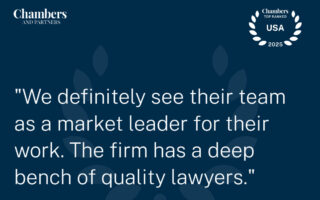Court Confirms Akin Not Limited to UM
By Daniel P. Buechler • Oct 15, 2005
On September 2, 2005, The Fourteenth District Court of Appeals expressly confirmed that severance of contractual and extra-contractual claims in a homeowner’s coverage action is mandatory where the insurer has made a settlement offer on the disputed contract claim. In Re Allstate Texas Lloyd’s, 2005 Tex. App. LEXIS 7333 (Tex. App. Houston 14th Dist. Sept. 2, 2005). Citing the Texas Supreme Court’s decision in Liberty Nat’l Fire Ins. Co. v. Akin, the Court of Appeals held that severance of bad faith claims is required where a settlement offer was made because evidence of the settlement, admissible only on the bad faith claim, would unfairly prejudice the insurer during the defense of the contract claim to such an extent that a fair trial on the contract claim would become unlikely. Id (citing Liberty Nat'l Fire Ins. Co. v. Akin, 927 S.W.2d 627, 630 (Tex. 1996)).
In In Re Allstate, the insureds/homeowners alleged breach of contract as well as extra-contractual bad faith claims. After pretrial mediation, Allstate made a settlement offer on all disputed breach of contract claims, but the offer was rejected. Thereafter, Allstate filed a motion to sever the extra-contractual claims from the breach of contract claim, but it was denied by the trial court. Allstate then filed a petition for writ of mandamus, alleging the trial court abused its discretion in denying the severance.
In Akin, the Texas Supreme Court reasoned that requiring an insurer to defend the contract claim at the same time and before the same jury that would consider evidence that the insurer had offered to settle the entire dispute would cause substantial prejudice to the insurer. Id. Notably, in the In Re Allstate case, the Court also held that the timing of an insurer’s settlement offer does not impact the necessity of severance, even if the offer is made after a bad faith cause of action has been filed. In Re Allstate, 2005 Tex. App. LEXIS 7333 at 7334-5.
Also notable, in In Re Allstate, the Fourteenth Court of Appeals rejected the homeowner/insured’s arguments that such mandatory severance is only applicable in uninsured/underinsured motorist (“UM/UIM”) cases. The Court noted that “[t]he Supreme Court has approved case law from courts of appeals holding that severance is required when an insurer has made a settlement offer,” In Re Allstate Texas Lloyd’s, 2005 Tex. App. LEXIS 7333 (Tex. App. Houston 14th Dist. Sept. 2, 2005). Although these prior cases dealt almost exclusively with the UM/UIM provision of the personal auto policy [as opposed to homeowner’s policies] the Court of Appeals was not persuaded by the home-owners/insureds argument, and found that the UM/UIM case law applicable to cases involving a homeowner’s policy. The Court further explained that in In Re Republic Lloyds, 104 S.W.3d 354, it had previously applied UIM case law to a case involving a homeowner’s policy. Id.
The Court also disagreed with the homeowners’ contention that Allstate had failed to establish that it would be prejudiced by a lack of severance. Citing State Farm Mut. Auto. Ins. Co. v. Wilborn, the Court stated, “An irreconcilable conflict arises if severance is denied in a case involving contractual and extra-contractual claims…the resolution of this conflict leaves but one decision…to order severance of the two causes of action and to abate the proceedings on the bad faith claim.” In Re Allstate, 2005 Tex. App. LEXIS 7333 at 7334 citing State Farm Mut. Auto. Ins. Co. v. Wilborn, 835 S.W.2d at 262.
In Re Allstate is significant in that it expressly applies the developed case law concerning severance and abatement in UM/UIM cases to motions for severance and abatement in cases involving homeowners’ policies. The In Re Allstate case further clarifies that the holding and reasoning in Akin applies to all bad faith cases where the insurer has made a settlement offer on a disputed contract claim abating bad faith claims until contractual liability has been established, regardless of when the settlement offer is made.






